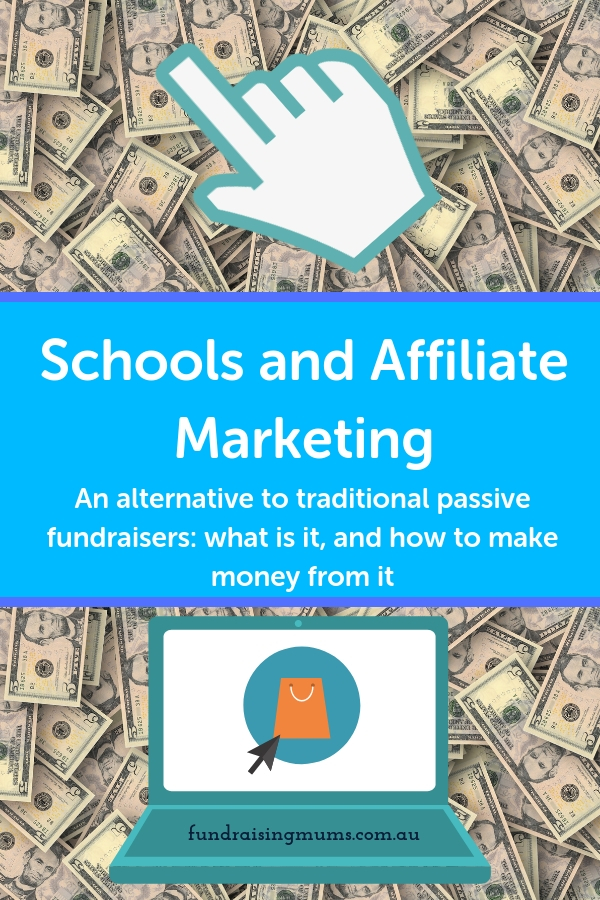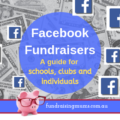
While Affiliate Marketing might be more commonly associated with bloggers, it’s still a source of income that other groups – such as schools, sports clubs and not-for-profits – could consider as a supplement to traditional fundraising. As long as you have a community of supporters and a way of connecting with them digitally (via newsletters, emails or a website) then affiliate marketing could work for you.
What is affiliate marketing?
Affiliate marketing is basically online advertising, where you run an ad or promote a particular business, driving traffic to their website, and if someone makes a purchase after clicking on the link, you receive a commission.
When you set up an affiliate link, you use a specific URL that enables the business to know that a purchaser came to their site from your site. Being able to track the links enables businesses to know where sales are coming from, and therefore how much commission to pay.
That sounds familiar…
There are a number of cashback fundraising sites that already exist and they have already done a lot of the hard work setting up the links and streamlining the process (read my article here). Schools and other fundraising groups can sign up to one of these sites, and while it is definitely easier than setting up your own affiliate links and they will have hundreds of businesses willing to give commissions, you will also find that they keep approximately half of the available commission in order to fund their site.
You are not limited by distance, school size or location
It is important to remember that affiliate marketing only earns you a commission when the purchase is made online. Even if the business you choose to affiliate with has a bricks-and-mortar shopfront, sending people to make purchases in person will not result in a commission.
This is one of affiliate marketing’s greatest strengths – since everything is done online, you are not limited by where you live or how big your school is. You can promote your affiliate links far beyond your school community, and purchases made across the country can still earn you a commission.
Best of all, most of the businesses allow up to 30 days between the person visiting your site and making the purchase, so even if someone reads your website, clicks the link and has a look around, but then doesn’t return to make the purchase for another week or two, even if they return directly to the site (not via yours) you still receive the commission.
How much money can we earn?
Affiliate marketing is a passive or background earner only. It’s the type of fundraiser that you set up once, and with adequate reminders and promotions to your community, you can watch it tick along in the background. Depending on which businesses you choose to work with, and how active your community is, you could potentially earn hundreds of dollars every year.
Commissions vary between businesses, but tend to be around 8-10% of each sale. If you had fifty families each spending $100 per year with your affiliate business, you could potentially earn $500. If 100 families each spent $20 per year, you could earn $200.
What sort of businesses offer affiliate marketing?
Obviously you need to be thoughtful when selecting affiliate businesses. It needs to be relevant to your particular community. Ask yourself what your community needs, desires and regularly spends money on. Fundraising Mums has various affiliate links with businesses that I see are relevant to parents of school aged kids –for example I was affiliated with Identity Direct (which sells personalised name labels and other school items,), Dymocks (which sells books) and Tastebuds (which sells chocolates). Unfortunately my affiliate that sells wine no longer offers commissions.
If you now click on any of those links, and decide to make a purchase within 30 days, the pixies which live in the computer (tracking cookies) will remember you came via my site, and I will receive a commission of 10%-20% of your purchase. Cheers!
Businesses you can create affiliate links with include clothing and fashion, toys and games, home and garden, telecommunications, health and beauty, magazines subscriptions, holidays and travel, personalised gifts, insurance and much more. It’s up to you to choose wisely based on your particular community.
Commission rates vary but if you select carefully for your community it could be very successful. For example, if you choose to work with P&O Cruises, they offer a 4% commission. That doesn’t sound like much until you realise that the average purchase is over $2,000 which means you’d make an $80 commission. Even if you only had two families who liked to go cruising every year, the commission would be the same amount as selling Entertainment Books to 11 families or 400 giant chocolate frogs.
How can a school or sports club set up affiliate marketing?
To be successful you need a website for your school or P&C and a way of reminding your community (social media or newsletters). You can still set up affiliate marking without a website though, and would be equally successful if you had your links set up in your email signature.
There are a number of affiliate programs which you can join for free, through which you select the individual companies you want to be an affiliate for. In Australia the major affiliate programs are Commission Factory, Commission Monster and Clixgalore.
For example, Commission Factory, which has over 500 affiliate businesses to choose from, has predominantly Australian businesses which is perfect for Aussie schools. Once you have set up your free account (providing details about the channels you will be using – ie your website or social media) you can begin choosing which businesses you would like to work with.
You will not automatically be accepted by every advertiser you request to work with, they each have differing requirements about traffic and whether you ‘fit’, but once you have been accepted into a program, they will provide you everything from a simple text link to banner adverts and images. Some advertisers will have videos you can embed in your site, and many other provide coupons and promotions which help you to maintain a regular stream of ‘news’ to your supporters.
As well as going via the affiliate programs, you can also apply to businesses individually. If you want to know if a particular business offers affiliate marketing, simply google their name and ‘affiliate marketing’. You usually won’t be able to tell from their standard website.
How to be successful at affiliate marketing
Apart from having someone a bit tech-savvy to do the initial set-up, the key to success (assuming you have chosen your affiliate businesses wisely) is keeping your community aware. If everyone forgets your school has an affiliate relationship with Identity Direct for example, and they don’t visit the Identity Direct via your website, you won’t get the commission. Equally, they can forget they should be shopping at Identity Direct and purchase their school labels elsewhere.
Make sure you explain to your community what you are doing and why. Explain how affiliate marketing works. Explain they need to click on the links in your newsletter/website or else the school won’t get the commission. Include this information in all New Family information packs and send reminders at the start of every school year.
The commission is not added to the cost of the product, so in theory it doesn’t cost your customers any more. The commission comes out of the businesses profit margin, so it’s important to remind your community that shopping via an affiliate link doesn’t cost them any more. It’s not like a ‘donation’ is tacked onto the cost of the purchase.
Keep your affiliates in regular view of your entire school community – use your website, newsletters, notice boards, emails and social media.
Explicitly ask your community to share the links with their family and friends. This might mean having to make very easy-to-share social media posts and emails which contain all the necessary information and links, and don’t require people to have to return to your school/club website to find the links.
If you have a regular newsletter that goes out to your school community, you could keep aside a small box at the bottom and use it to remind your parents about the latest special or coupon from your affiliate business. By taking advantage of the ever-changing range of promotions, it remains fresh and new, and readers’ eyes won’t drift over them.
Build your affiliate link into your P&C email signature, share your links on your school/club Facebook page, and do regular promotions in line with the seasons.
Be savvy enough to time your reminders and promotions properly. If you want your school community to be buying bunches of flowers for Mothers’ Day or magazine subscriptions for Fathers’ Day, then you need to send the reminders out at least 4-6 weeks in advance.
Things to be aware of
You will probably only be paid your commissions when your earnings reach a certain point. Commission Factory pays out when you earn $50.
Some commissions will be held back until the transaction is finalised – this is particularly in the case of travel related commissions. People might pay for their holiday upfront, but often the commission might not be paid until the trip is actually over. This is because the travel could always be cancelled, and it’s difficult for commissions to be reclaimed.
If you are depending on only one or two affiliate businesses, keep in mind that they can terminate their affiliate programs at any stage, sometimes with little or no notice. This might be because their business is shutting down, or perhaps they are now successful enough not to warrant needing the extra promotions. (Ironically, about a week after publishing this article I received word Identity Direct were suspending their affiliate network – which just proves my point). Depending on the commission group you are working through, you will be notified of this, but it’s important you keep a record of where your links are, because as soon as the affiliate relationship ends, all your special links will no longer work.
Here is a great tip I learned from social media guru Amanda Kendle – run your website through the Broken Links Checker here, and it will scan your entire site and provide a list of all your broken links – for free.




